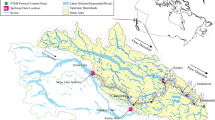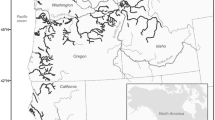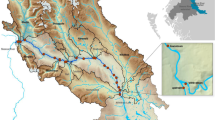Abstract
Water temperature is a key determinant of biological processes in rivers. Temperature in northern latitude rivers is expected to increase under climate change, with potentially adverse consequences for cold water-adapted species. In Canada, little is currently known about the timescales or magnitude of river temperature change, particularly in large (≥104 km2) watersheds. However, because Canadian watersheds are home to a large number of temperature-sensitive organisms, there is a pressing need to understand the potential impacts of climate change on thermal habitats. This paper presents the results of a study to simulate the effects of climate change on the thermal regime of the lower Saint John River (SJR), a large, heavily impounded, socio-economically important watershed in eastern Canada. The CEQUEAU hydrological-water temperature model was calibrated against river temperature observations and driven using meteorological projections from a series of regional climate models. Changes in water temperature were assessed for three future periods (2030–2034, 2070–2074 and 2095–2099). Results show that mean water temperature in the SJR will increase by approximately ~1 °C by 2070–2074 and a further ~1 °C by 2095–2099, with similar findings for the maximum, minimum and standard deviation. We calculated a range of temperature metrics pertaining to the Atlantic Salmon and Striped Bass, key species within the SJR. Results show that while the SJR will become increasingly thermally-limiting for Atlantic Salmon, the Striped Bass growth season may actually lengthen under climate change. These results provide an insight into how climate change may affect thermal habitats for fish in eastern Canadian rivers.








Similar content being viewed by others
References
Ahmadi-Nedushan B, St-Hilaire A, Ouarda TBMJ, Bilodeau L, Robichaud É, Thiémonge N, Bobée B (2007) Predicting river water temperatures using stochastic models: case study of the Moisie River (Québec, Canada). Hydrol Process 21:21–34
Andrews SN, Linnansaari T, Curry RA, Dadswell MJ (2017) The misunderstood striped bass of the Saint John River, New Brunswick: past, present, and future. N Am J Fish Manag 37:235–254
Bloomfield JP, Williams RJ, Gooddy DC, Cape JN, Guha P (2006) Impacts of climate change on the fate and behaviour of pesticides in surface and groundwater—a UK perspective. Sci Total Environ 369:163–177
Breau C (2013). Knowledge of fish physiology used to set water temperature thresholds for in-season closures of Atlantic Salmon (Salmo salar) recreational fisheries. Department of Fisheries and Oceans, Canadian Science Advisory Secretariat, 2012/163, 24 p
Breau C, Cunjak RA, Bremset G (2007) Age-specific aggregation of wild juvenile Atlantic Salmon Salmo salar at cool water sources during high temperature events. J Fish Biol 71:1179–1191
Breau C, Cunjak RA, Peake SJ (2011) Behaviour during elevated water temperatures: can physiology explain movement of juvenile Atlantic Salmon to cool water? J Anim Ecol 80:844–853
Brodeur NN, Hébert C, Caissie D, Breau C (2015). Predicting stream temperatures under a climate change scenario: impacts on critical temperatures for Atlantic Salmon (Salmo salar). Department of Fisheries and Oceans, Canadian Technical Report of Fisheries and Aquatic Sciences 3118, 44 p
Caissie D (2006) The thermal regime of rivers: a review. Freshw Biol 51:1389–1406
Caissie D, Luce CH (2017) Quantifying streambed advection and conduction heat fluxes. Water Resour Res 53:1595–1624
Caissie D, Satish MG, El-Jabi N (2005) Predicting river water temperatures using the equilibrium temperature concept with application on Miramichi River catchments (New Brunswick, Canada). Hydrol Process 19:2137–2159
Caissie D, Satish MG, El-Jabi N (2007) Predicting water temperatures using a deterministic model: application on Miramichi River catchments (New Brunswick, Canada). J Hydrol 336:303–315
Caissie D, Breau C, Hayward J, Cameron P (2012). Water temperature characteristics of the Miramichi and Restigouche Rivers. Canadian Science Advisory Secretariat, Research Document 2012/165, p
Caissie D, El-Jabi N, Turkkan N (2014) Stream water temperature modeling under climate change scenarios B1 & A2. Can Tech Rep Fish Aquat Sci 3106:51
Clews E, Durance I, Vaughan IP, Ormerod SJ (2010) Juvenile salmonid populations in a temperate river system track synoptic trends in climate. Glob Chang Biol 16:3271–3283
COSEWIC (2012) COSEWIC assessment and status report on the Striped Bass Morone saxatilis in Canada. Committee on the Status of Endangered Wildlife in Canada, Ottawa, 79 p
Coutant CC (1990) Temperature-oxygen habitat for freshwater and coastal striped bass in a changing climate. Trans Am Fish Soc 119:240–253
Curry RA, Gautreau MD (2010) Freshwater fishes of the Atlantic maritime Ecozone. In: McAlpine DF, Smith IM (eds) Assessment of species diversity in the Atlantic maritime Ecozone. NRC Research Press, Ottawa, pp 599–612
Dadswell MJ (1976). Notes on the biology and resource potential of Striped Bass in the Saint John estuary. Pages 1–20 in M. J. Dadswell (Eds). Baseline survey and living resource potential study of the Saint John River estuary, volume III: fish and invertebrates. St. Andrews, New Brunswick: Huntsman Marine Laboratory
Daigle A, St-Hilaire A, Ouellet V, Corriveau J, Ouarda TBMJ, Bilodeau L (2009) Diagnostic study and modeling of the annual positive water temperature onset. J Hydrol 370:29–38
Daigle A, Jeong DI, Lapointe MF (2015) Climate change and resilience of tributary thermal refugia for salmonids in eastern Canadian rivers. Hydrol Sci J 60:1044–1063
Daufresne M, Roger MC, Capra H, Lamouroux N (2004) Long-term changes within the invertebrate and fish communities of the upper Rhône River: effects of climatic factors. Glob Chang Biol 10:124–140
Delpla I, Jung AV, Baures E, Clement M, Thomas O (2009) Impacts of climate change on surface water quality in relation to drinking water production. Environ Int 35:1225–1233
DFO (2011). Allowable harm assessment of Striped Bass (Morone saxatilis) in the southern Gulf of St. Lawrence. Department of Fisheries and Oceans, Can. Sci. Advis. Sec. Sci. Advis. Rep. 2011/014
Dominy CL (1973) Recent changes in Atlantic Salmon (Salmo salar runs in the light of environmental changes in the Saint John River, New Brunswick, Canada). Biol Conserv 5:105–113
Dugdale SJ, Franssen J, Corey E, Bergeron NE, Lapointe M, Cunjak RA (2016) Main stem movement of Atlantic Salmon parr in response to high river temperature. Ecol Freshw Fish 25:429–445
Dugdale SJ, St-Hilaire A, Allen Curry R (2017a) Automating drainage direction and physiographic inputs to the CEQUEAU hydrological model: sensitivity testing on the lower Saint John river watershed, Canada. J Hydroinf 19:469–492
Dugdale S, St-Hilaire A, Curry RA (2017b). Hydrological and water temperature modelling for dam decommissioning and climate change studies. Proceedings of the 10th World Congress of EWRA ‘Panta Rhei’, 5–9 July 2017, Athens, Greece. European Water Resources Association, 417–423
El-Jabi N, Caissie D, Turkkan N (2014) Water quality index assessment under climate change. Journal of Water Resource and Protection 6:533–542
Elliott JM (1991) Tolerance and resistance to thermal stress in juvenile Atlantic Salmon, Salmo salar. Freshw Biol 25:61–70
Elliott JM, Elliott JA (2010) Temperature requirements of Atlantic Salmon Salmo salar, brown trout Salmo trutta and Arctic charr Salvelinus alpinus: predicting the effects of climate change. J Fish Biol 77:1793–1817
Farr TG, Rosen PA, Caro E, Crippen R, Duren R, Hensley S, Kobrick M, Paller M, Rodriguez E, Roth L, Seal D, Shaffer S, Shimada J, Umland J, Werner M, Oskin M, Burbank D, Alsdorf D (2007) The shuttle radar topography mission. Rev Geophys 45:RG2004
Ficke A, Myrick C, Hansen L (2007) Potential impacts of global climate change on freshwater fisheries. Rev Fish Biol Fish 17:581–613
Ficklin DL, Stewart IT, Maurer EP (2013) Effects of climate change on stream temperature, dissolved oxygen, and sediment concentration in the Sierra Nevada in California. Water Resour Res 49:2765–2782
Filipe AF, Lawrence JE, Bonada N (2013) Vulnerability of stream biota to climate change in mediterranean climate regions: a synthesis of ecological responses and conservation challenges. Hydrobiologia 719:331–351
Finlay JC (2003) Controls of streamwater dissolved inorganic carbon dynamics in a forested watershed. Biogeochemistry 62:231–252
FOPO (2017) Wild Atlantic Salmon in eastern Canada, report of the standing committee on fisheries and oceans. Parliament of Canada, Ottawa, 37 p
Garner G, Malcolm IA, Sadler JP, Hannah DM (2017) The role of riparian vegetation density, channel orientation and water velocity in determining river temperature dynamics. J Hydrol
Gauvin St-Denis B, Huard D (2015) Climate scenarios for the Mactaquac ecosystem studies. Ouranos, Montréal, 16 p
Gennaretti F, Sangelantoni L, Grenier P (2015) Toward daily climate scenarios for Canadian Arctic coastal zones with more realistic temperature-precipitation interdependence. Journal of Geophysical Research: Atmospheres 120:11,862–811,877
Greene KE, Zimmerman JL, Laney RW and Thomas-Blate JC (2009). Atlantic Coast Diadromous Fish Habitat: Review of Utilization, Threats, Recommendations for Conservation, and Research Needs. Atlantic States Marine Fisheries Commission Habitat Management Series No. 9. Washington, DC 465 p
Hannah DM, Garner G (2015) River water temperature in the United Kingdom: changes over the 20th century and possible changes over the 21st century. Prog Phys Geogr 39:68–92
Hare F, Dickison R, Ismail S (1997). Variations of climate and streamflow over the Saint John Basin since 1872. Proceedings of the 9th Workshop on the Hydraulics of Ice Covered Rivers, Fredericton, New Brunswick: Committee on River Ice Processes and the Environment
Hari RE, Livingstone DM, Siber R, Burkhardt-Holm P, GÜTtinger, H. (2006) Consequences of climatic change for water temperature and brown trout populations in alpine rivers and streams. Glob Chang Biol 12:10–26
Hayman S, Thomas M, Beaman N, Gilks P (2010) Selection of an effective ASR-prevention strategy for use with a highly reactive aggregate for the reconstruction of concrete structures at Mactaquac generating station. Cem Concr Res 40:605–610
Hebert C, Caissie D, Satish MG, El-Jabi N (2011) Study of stream temperature dynamics and corresponding heat fluxes within Miramichi River catchments (New Brunswick, Canada). Hydrol Process 25:2439–2455
Hill RA, Hawkins CP, Jin J (2014) Predicting thermal vulnerability of stream and river ecosystems to climate change. Clim Chang 125:399–412
Hurst TP, Conover DO (2002) Effects of temperature and salinity on survival of young-of-year Hudson river striped bass (Morone saxatilits): implications for optimal overwintering habitats. Can J Fish Aquat Sci 59:787–795
Hurst TP, Conover DO (2003) Seasonal and interannual variation in the Allometry of energy in juvenile striped bass. Ecology 84(12):3360–3369
Isaak DJ, Rieman BE (2013) Stream isotherm shifts from climate change and implications for distributions of ectothermic organisms. Glob Chang Biol 19:742–751
Jackson FL, Fryer RJ, Hannah DM, Millar CP, Malcolm IA (2018) A spatio-temporal statistical model of maximum daily river temperatures to inform the management of Scotland's Atlantic salmon rivers under climate change. Sci Total Environ 612:1543–1558
Jensen AJ, Johnsen BO, Saksgård L (1989) Temperature requirements in Atlantic Salmon (Salmo salar), Brown trout (Salmo trutta), and Arctic char (Salvelinus alpinus) from hatching to initial feeding compared with geographic distribution. Can J Fish Aquat Sci 46:786–789
Jeong DI, Daigle A, St-Hilaire A (2013) Development of a stochastic water temperature model and projection of future water temperature and extreme events in the Ouelle River basin in Québec, Canada. River Res Appl 29:805–821
Jonsson B, Forseth T, Jensen AJ, NÆSje, T.F. (2001) Thermal performance of juvenile Atlantic Salmon, Salmo salar L. Funct Ecol 15:701–711
Justice C, White SM, McCullough DA, Graves DS, Blanchard MR (2017) Can stream and riparian restoration offset climate change impacts to salmon populations? J Environ Manag 188:212–227
Kaushal SS, Likens GE, Jaworski NA, Pace ML, Sides AM, Seekell D, Belt KT, Secor DH, Wingate RL (2010) Rising stream and river temperatures in the United States. Front Ecol Environ 8:461–466
Kidd SD, Curry RA, Munkittrick KR (eds) (2011) The Saint John River: a state of the environment report. Canadian Rivers Institute, Fredericton, 175 p
Kleissl J (2013) Solar energy forecasting and resource assessment. Academic Press, Amsterdam, 462 p
Koo TSY, Ritchie DE Jr. (1973). Growth of juvenile Striped Bass, Morone saxatilis, as determined by tagging and recapture. In: Pacheco, A.L. (Eds). Proceedings of a workshop on egg, larval and juvenile stages of fish in Atlantic coast estuaries. Highlands, NJ: NOAA/NMFS Sandy Hook Lab. Tech. Series Rep. 1, p. 124–125
Krause P, Boyle DP, Bäse F (2005) Comparison of different efficiency criteria for hydrological model assessment. Adv Geosci 5:89–97
Kurylyk BL, MacQuarrie KTB, Voss CI (2014). Climate change impacts on the temperature and magnitude of groundwater discharge from shallow, unconfined aquifers. Water Resources Research, 50(4):3253–3274
Kurylyk BL, MacQuarrie KTB, Linnansaari T, Cunjak RA, Curry RA (2015) Preserving, augmenting, and creating cold-water thermal refugia in rivers: concepts derived from research on the Miramichi River, New Brunswick (Canada). Ecohydrology 8:1095–1108
Kwak J, St-Hilaire A, Chebana F, Kim G (2017) Summer season water temperature modeling under the climate change: case study for Fourchue River, Quebec, Canada. Water 9:346
Latifovic R, Homer C, Ressl R, Pouliot D, Hossain SN, Colditz RR, Olthof I, Giri CP, Victoria A (2012) North American land-change monitoring system. In: Giri CP (ed) Remote sensing of land use and land cover. CRC Press, Boca Raton, pp 303–324
Mather M, Parrish D, Campbell C, McMenemy J, Smith J (2008) Summer temperature variation and implications for juvenile Atlantic Salmon. Hydrobiologia 603:183–196
Mills KE, Pershing AJ, Sheehan TF, Mountain D (2013) Climate and ecosystem linkages explain widespread declines in north American Atlantic Salmon populations. Glob Chang Biol 19:3046–3061
Mohseni O, Stefan HG, Erickson TR (1998) A nonlinear regression model for weekly stream temperatures. Water Resour Res 34:2685–2692
Morin G, Couillard D (1990) Chapter 5: predicting river temperatures with a hydrological model. In: Cheremisinoff N (ed) Encyclopedia of fluid mechanics: surface and groundwater flow phenomena. Gulf Publishing, Houston, pp 171–209
Morin G, Paquet P (2007) Modèle hydrologique CEQUEAU, rapport de recherche no R000926. Université du Québec, INRS-Eau,Terre et Environnement, Québec, 458 p
Penman HL (1948). Natural Evaporation from Open Water, Bare Soil and Grass. Proceedings of the Royal Society of London. Series A. Mathematical and Physical Sciences, 193, 120–145
Pepin P, Petrie B, Therriault J-C, Narayanan S, Harrisson WG, Frank KT, Chassé J, Colbourne EB, Gilbert D, Gregory D, Harvey M, Maillet GL, Mitchell M, Starr M (2005). The Atlantic Zone Monitoring Program (AZMP): Review of 1998–2003. Canadian Technical Report of Hydrography and Ocean Science 242, Department of Fisheries and Oceans, 87 p
Pinfold G (2011) Economic Value of Wild Atlantic Salmon. Report to the Atlantic Salmon Federation. Gardner Pinfold Consultants Inc., Halifax, 70 p
Priestly CHB, Taylor RJ (1972) On the assessment of surface heat flux and evaporation using large-scale parameters. Mon Weather Rev 100:81–92
Rienecker MM, Suarez MJ, Gelaro R, Todling R, Bacmeister J, Liu E, Bosilovich MG, Schubert SD, Takacs L, Kim G-K, Bloom S, Chen J, Collins D, Conaty A, da Silva A, Gu W, Joiner J, Koster RD, Lucchesi R, Molod A, Owens T, Pawson S, Pegion P, Redder CR, Reichle R, Robertson FR, Ruddick AG, Sienkiewicz M, Woollen J (2011) MERRA: NASA’s modern-era retrospective analysis for research and applications. J Clim 24:3624–3648
Roberts JJ, Fausch KD, Peterson DP, Hooten MB (2013) Fragmentation and thermal risks from climate change interact to affect persistence of native trout in the Colorado River basin. Glob Chang Biol 19:1383–1398
Rulifson RA, Dadswell MJ (1995) Life history and population characteristics of striped bass in Atlantic Canada. Trans Am Fish Soc 124:477–507
Sheffield J, Wood EF, Roderick ML (2012) Little change in global drought over the past 60 years. Nature 491:435
Solomon DJ, Lightfoot GW (2008) The thermal biology of brown trout and Atlantic Salmon. Environment Agency, Bristol, 42 p
St-Hilaire A, Morin G, El-Jabi N, Caissie D (2000) Water temperature modelling in a small forested stream: implication of forest canopy and soil temperature. Can J Civ Eng 27:1095–1108
St-Hilaire A, El-Jabi N, Caissie D, Morin G (2003) Sensitivity analysis of a deterministic water temperature model to forest canopy and soil temperature in catamaran brook (New Brunswick, Canada). Hydrol Process 17:2033–2047
St-Hilaire A, Boucher M-A, Chebana F, Ouellet-Proulx S, Zhou QX, Larabi S, Dugdale SJ, Latraverse M (2015). Breathing new life to an older model: the Cequeau tool for flow and water temperature simulations and forecasting. Proceedings of the 22nd Canadian Hydrotechnical Conference. April 29–May 2, 2015; Montréal, Québec, Canada
Thornthwaite CW (1948) An approach toward a rational classification of climate. Geogr Rev 38:55–94
van Vliet MTH, Zwolsman JJG (2008) Impact of summer droughts on the water quality of the Meuse river. J Hydrol 353:1–17
van Vliet MTH, Ludwig F, Zwolsman JJG, Weedon GP, Kabat P (2011) Global river temperatures and sensitivity to atmospheric warming and changes in river flow. Water Resour Res 47:W02544
van Vliet MTH, Franssen WHP, Yearsley JR, Ludwig F, Haddeland I, Lettenmaier DP, Kabat P (2013a) Global river discharge and water temperature under climate change. Glob Environ Chang 23:450–464
van Vliet MTH, Ludwig F, Kabat P (2013b) Global streamflow and thermal habitats of freshwater fishes under climate change. Clim Chang 121:739–754
Webb BW, Hannah DM, Moore RD, Brown LE, Nobilis F (2008) Recent advances in stream and river temperature research. Hydrol Process 22:902–918
Wedekind C, Küng C (2010) Shift of spawning season and effects of climate warming on developmental stages of a grayling (Salmonidae). Conserv Biol 24:1418–1423
Westin DT, Rogers BA (1978). Synopsis of the biological data on the Striped Bass. University of Rhode Island Marine Technical Report No. 67: 1–154
Whitehead PG, Wilby RL, Battarbee RW, Kernan M, Wade AJ (2009) A review of the potential impacts of climate change on surface water quality. Hydrol Sci J 54:101–123
Zheng C, Wang P (1996) Parameter structure identification using tabu search and simulated annealing. Adv Water Resour 19:215–224
Acknowledgements
This work forms part of the Mactaquac Aquatic Ecosystem Study (MAES) funded by an NSERC/CSNRG collaborative research and development grant (CRDPJ: 462708-13) in partnership with NB Power/Énergie NB. A previous shorter version of this paper was presented at the 10th World Congress of EWRA ‘Panta Rhei’, Athens, Greece, 5-9 July 2017. The authors would like to thank Sébastien Ouellet-Proulx for providing water temperature data for the SJR at Maugerville. This paper was improved thanks to the constructive comments of two anonymous referees.
Author information
Authors and Affiliations
Corresponding author
Ethics declarations
Conflict of Interest
The authors declare that they have no conflict of interest.
Rights and permissions
About this article
Cite this article
Dugdale, S.J., Allen Curry, R., St-Hilaire, A. et al. Impact of Future Climate Change on Water Temperature and Thermal Habitat for Keystone Fishes in the Lower Saint John River, Canada. Water Resour Manage 32, 4853–4878 (2018). https://doi.org/10.1007/s11269-018-2057-7
Received:
Accepted:
Published:
Issue Date:
DOI: https://doi.org/10.1007/s11269-018-2057-7




